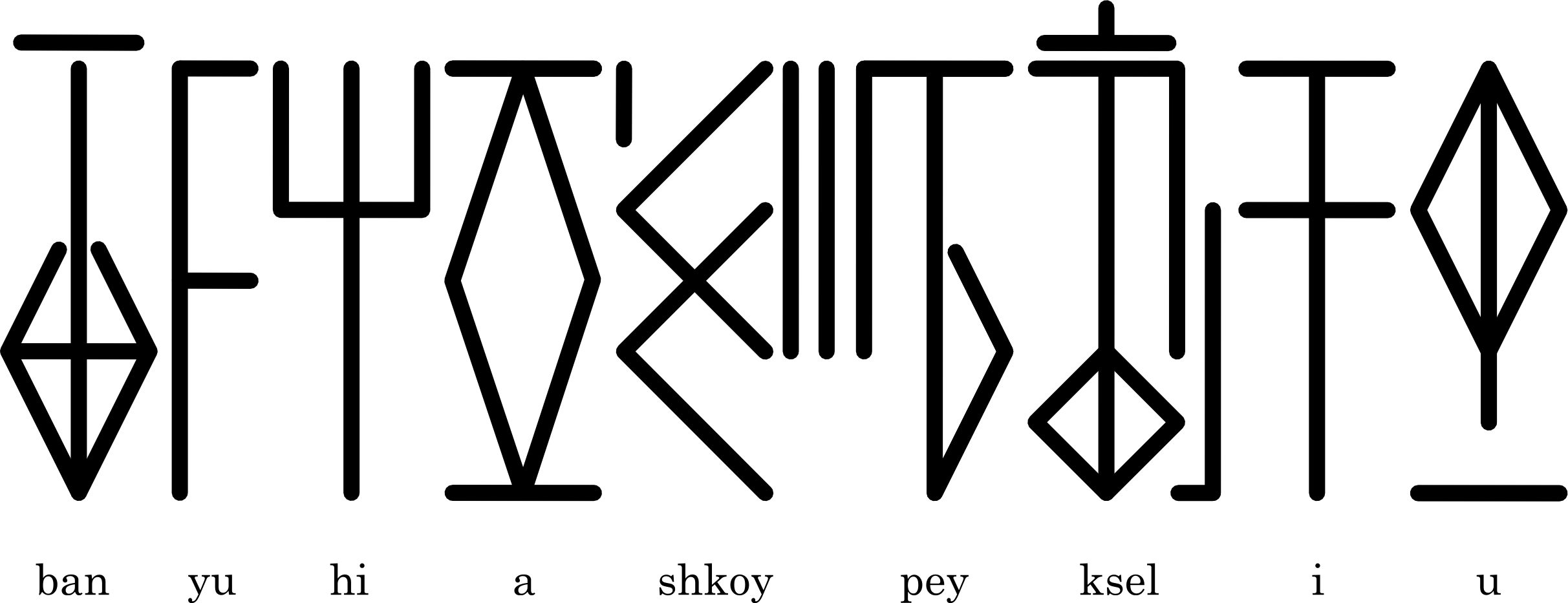
A pamphlet by Tetsuo Milk, Ph.D
Assistant Professor of Anthropology, University of Texas at Austin
I introduce you
Hello, English readers!
A few days before now, I visited a train in which every seat was provided with free magazines. One of the magazines was a catalog of things you can buy, and such an object-of-purchase was advertised as in the following:
PURCHTRIN FOR BUSINESS
YOUR PORTAL TO A STELLAR CAREER
"An essential tool" - Business Traveler
The language of commerce and high diplomacy in the twenty-first century is Alien Purchtrin. With this language comes a new set of challenges, and the lure of interstellar commerce.
Meet the challenge with TTIS, Therion's total immersion system. Trains you to converse naturally and to write effective business communication, all while learning at your own pace.
{{{AND ETC. AND ETC.!}}}
You can learn Purchtrin if you want, but if you think it will help you in business you are being dumb. There are two reasons!
THE FIRST REASON
Everyone who knows Purchtrin also knows human languages! I learned English. Maybe when you read this you think my English is not good, but your Purchtrin will be worse!
You can speak English to a Purchtrin speaker, and he will hear Purchtrin thanks to subconscious translation. It will not be very idiomatic, but idioms should not be necessary unless you are trying to sell poetry or fucking.
THE SECOND REASON
Purchtrin is not a language for business! Business is the manipulation of scarcity, and all Purchtrin concepts of scarcity are borrowed from other languages like the Simple Affect Metadata Exchange. I will not pretend that there is no business with Purchtrin speakers. As part of my experience on Earth I work with many businesses such as the University of Texas at Austin, Reflex Games Inc., and etc. However all such business is conducted in human languages.
If you want to be successful in business with the Constellation, you should learn how people have done this in the past. You should learn Pey Shkoy.
What Is Pey Shkoy You Ask Me
Pey Shkoy is a language for business! Seventeen million years ago, the Constellation encountered the species you call the Aliens on our homeworld, Down. Upon this occurance came a renaissance of art and culture... and business! Most beautiful was the business conducted by the Ip Shkoy culture, in the language of Pey Shkoy.
Yes, this sounds exciting to you, o Business Traveler! This is more like your stuff! My friend, read on and learn Pey Shkoy. You will enjoy new forms of art and learn about the process that created the art.
Write Sexier Tattoos In Chospe Script
To learn Pey Shkoy for business, you must learn Chospe, the popular system of writing of ancient Aliens. First we practice with English. When words you already know become Chospe syllable-groups, you will learn to make the reverse journey, and Chospe script will become sounds your mouth can make. Write your name in Chospe script and you have an image for a sexy tattoo.
It's time to begin! Here's my name, "Tetsuo Milk", in Chospe script. Ooh la la!
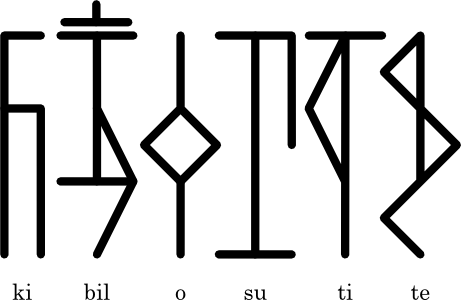
How did my name become those characters? Of course because: sounds
your mouth might make correspond to Chospe syllables. The following
table is important in telling you how! One of the table's rows is a
consonant that your mouth might start making ("p", "t", "k" and etc.),
and then every column is a vowel that might follow it ("i", "e", "a",
and etc.) If you read the table left-to-right up-to-down as in
English, you read "pi", "pe", "pa", "po", "pu", then "ti", "te", "ta",
"to", tu", and etc.

[Table 1. A Chospe abugida]
Each syllable is a consonant entailed by a vowel, as in human writing systems like Japanese katakana and Kannada script. The final row shows the vowels "i" "e" "a" "o" "u" by themselves, with no entailing consonant. (The penultimate row is that of the dental chafe, which is not a human consonant. Please read later on for that.)
There are 5 vowel sounds in Pey Shkoy. They are similar to English vowels because a human mouth and an Alien mouth are similar.
- The Pey Shkoy "u" is the ue sound in English "true".
- The Pey Shkoy "o" is the o sound in English "poke".
- The Pey Shkoy "a" is the a sound in English "false".
- The Pey Shkoy "e" is the a sound in English "paste".
- The Pey Shkoy "i" is the i sound in English "liter".
[Table 2. A Pey Shkoy and English vowel chart.]
See this: English has a wider range of vowel sounds then Pey Shkoy. To a Pey Shkoy listener, English "bet", "bait", and "bat" all have the sound of Pey Shkoy "e". Perhaps it will help you to compare this unto the vowel sounds used in the Spanish language.
Anyway! With vowel and consonant information, most human-style names can become Chospe script. Let me show you. Here's my name in Latin script:
Tetsuo Milk
Now I begin the work of transliteration.
In the first step, you look at the vowel chart (Table 2) and see which Pey Shkoy vowel is the best choice for each English vowel. All my vowels match up between English and Pey Shkoy, so I didn't need to change anything:
Tetsuo Milk
But if my name was Ashley, I would change it to "Eshli".
In the second step, you split the words into syllables. A syllable should not start with a vowel sound unless there is no alternative!
tet
su
o
mil
kUnfortunately, a consonant sound on its own is not a syllable! Make it a syllable by adding the "i" sound:
tet
su
o
mil
kiI now feature a special note for humans who like to say "m". Pey Shkoy lacks the "m" sound! If you said "m" the Ip Shkoy would hear it as "b". So, replace an "m" with a "b".
tet
su
o
bil
ki- Now you will use Table 1 to look up the Chospe character for each
syllable. If a syllable ends with a consonant sound, don't worry about
that until after you do this.
Latin script Chospe script te (+t, but don't worry about it yet) 
su 
o 
bi (+l, but don't worry about it yet) 
ki 
Now it's time to worry! A character that ends with a consonant sound must have a diacritic applied to it. Here you see how the "i" syllable is modified to become "in", "il", "ir", and etc.
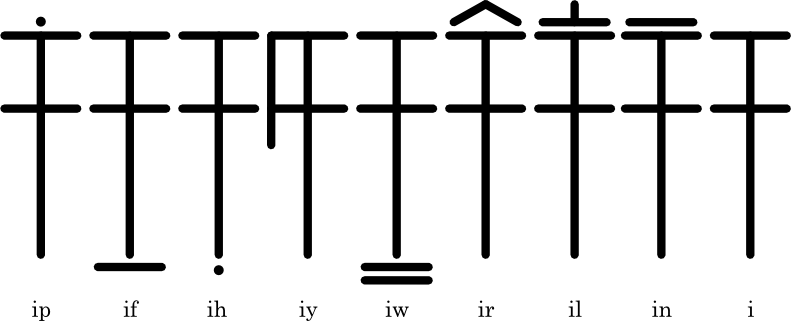
[Table 3. The diacritics]
To get the "il" syllable you allow the diacritic
 to surmount the "i" syllable
to surmount the "i" syllable
 . The result is envisioned
as
. The result is envisioned
as  . When the same
diacritic surmounts the "bi" syllable
. When the same
diacritic surmounts the "bi" syllable  , the
result is the "bil" syllable
, the
result is the "bil" syllable  .
.
Now you see that my tattoo approaches completion!
te+t  + ????
+ ????su 
o 
bi+l 
ki 
However! What should happen with te+t? In Pey Shkoy, syllables never end with the "t" sound, so there is no "t" diacritic and no "tet" therefore.
There may be no diacritic for your consonant. If this happens to you: don't panic. Take the missing consonant and make it a separate syllable. My "tet" becomes "te ti".
te 
ti 
su 
o 
bi+l 
ki 
The final step is to write everything down properly. Pey Shkoy is written horizontally starting at the right side of the paper:

- However, for some few words the transliteration story is not
over. Most diacritics go at the end of syllables, but four crunchy
diacritics begin their syllable: ch, k, s,
and sh. I believe such crunchy sounds are rare in English, but
you may see them when two words combine to form one word:
"beachtowel": "bi ch+ta we li", not "bi chi ta we li"
"forklift" : "fu+r k+li+f ti", not "fu+r ki li+f ti"
"bastard" : "ba s+ta+r di", not "ba si ta+r di"
"hashpipe": "ha sh+pa+p", not "ha chi pa+p"In Table 4 you see how the crunchy diacritics alter the syllable "pi" to form "shpi", "spi", "kpi", and "chpi". It looks the same when they modify any other syllable.
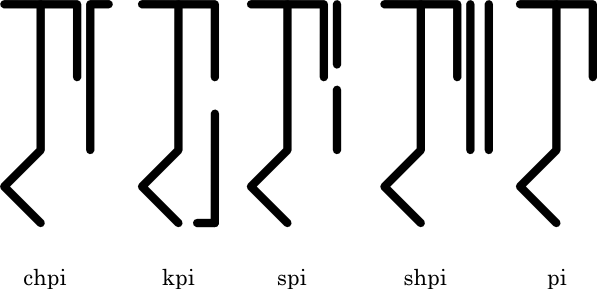
[Table 4. The crunchy diacritics]
Here are some human names that need to use the crunchy diacritics:
- "Ashley": "e sh+li"
- "Roxy": "ra k+si"
- "Astrid": "a s+ti ri di"
And here I present a different transliteration of my own name when using the crunchy diacritics:
- "Tetsuo": "te ti s+wo"
Now you are ready for your sexy tattoo! Here are some more tattoo ideas for common American names:
| Ashley (Eshli) | Jennifer (Chenifar) | Linda (Linda) |
|---|---|---|
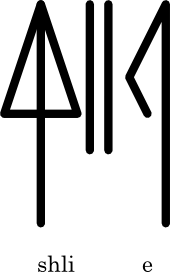
|
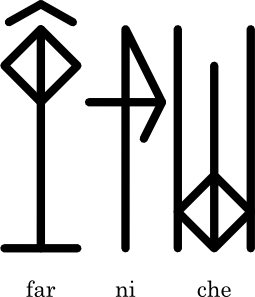
|

|
Handwriting
You can write Chospe symbols with a free hand, but to practice your handwriting, you can copy this template and trace over it.


This is the Kopuu, i.e. the "grid" as in "Royalty-Free System of Gridded Char". Templates as this were used in printing presses to produce letters uniformly. Some people bought paper full of these templates and spelled out letters by filling in the segments with ink. But, writing by hand is fine.
Things to worry about
You already know a language so you perhaps believe you are some hot-shot. Maybe you know two or three languages! But they are all human languages. As you learn about Pey Shkoy, you will encounter things that are not found in human languages. Be aware, or be confused!
The dental chafe
One of the Pey Shkoy consonants is described in Latin script as an apostrophe, '. (You can see near the end of Table 1.) You don't need this symbol when transliterating English, because it's the sound an Alien makes when scraping your oral ridges together. When a human wants to speak Pey Shkoy, you can simulate this sound by clicking the teeth.
Perhaps for a more authentic sound you believe you will grind the teeth. I unrecommend this because human teeth do not regenerate. If you are very young it's okay because the teeth will fall out and grow back.
Gendered registers
Pey Shkoy has three different vocabularies! When you read a Pey Shkoy book you might see that the word for "hindarm" is "ka'a" on one side of the paper, and "oniuno" on the other side, plus then "pip" later on. It depends on who is speaking:
- The dasupey register is used when a woman speaks.
- The kvipey register is used when a man speaks to a woman.
- The bichepey register is used when a man speaks to a man.
As an example, I wrote the phrase "Please hand me the soldering iron." in all three registers:
- Dasupey: "tepep dipip a up chaniuia ioh up taifiuia"
- Kvipey: "skofof eshpolol ef shku naipitiu di shku toipitiu"
- Bichepey: "uioii bekii sie o ituibeta wa o peinbeta"
The grammar is forever the same, but the vocabulary is forever different. If you are a woman, do not think you can learn only dasupey and have fluency. You must know kvipey to read books where a man speaks to you, and you must know bichepey to understand Pey Shkoy jokes.
But no! When you speak or write, you should always use dasupey. Because of: what I am about to tell you.
A section about some evil beliefs
Now this is serious. In the time under study, Ip Shkoy society had norms that a man should not do certain things such as operate large machines or learn multivariable calculus. It was a belief held by the society as a whole, not just by individuals you could see.
As this, for the whole history of Pey Shkoy, dasupey sounded more authoratative and respectful than kvipey or bichepey. If a man were to write a technical document, he would write in dasupey. Because of this: if written in the male registers, no one would take such a document seriously.
Before the Constellation contacted Down, Ip Shkoy society had been improving slowly. It was common for men to run small businesses such as shops. Only a few years after contact, many Ip Shkoy men joined the military and used weapons in a war. (I am sardonic!)
The more this social progress, the more was a decline of the kvipey and bichepey registers. Men used dasupey when speaking to someone of unknown gender, or as a way of showing respect when performing diplomacy. Farang used dasupey even when male, as it was confusing for them to switch back and forth every day. Eventually some men asserted gender equality by using dasupey only.
Within 200 years of contact with the Constellation, every speaker used dasupey at all times. The Pey Shkoy successor languages did not feature gendered registers. It was a fad that died out. A lot of culture was lost as the Ip Shkoy men avandoned kvipey and bichepey, but they thought other things were more important.
The meaning of this is: when you write or speak, you should use dasupey only. Everyone who would complain about this is dead.
Prepositions don't mean anything
In English, there are many prepositions and each one always mean the same thing. "After" always means the one thing happened and then the other happened. "Under" always means that if you lift the one thing you'll find the other. But in Pey Shkoy there are only five prepositions, and they have a different meaning depending on the verb you're using.
Here are the five prepositions. Each has a different word in the three registers, but there are only five.
| dasupey | kvipey | bichepey |
|---|---|---|
| a | ef | sie |
| ksey | bu | oeto |
| be | ein | u |
| ioh | di | wa |
[Table 6. The fifteen words for Pey Shkoy prepositions.]
Do not worry yourself about the first one! There is no misprint, no secret information! That preposition is just the empty word, in all three registers. In the future I will show it in tables as "∅". But that's not its name.
You can think of the prepositions as containers for different phrases that follow the verb and enhance its meaning. As a suppose, you are cooking food by applying direct heat. In dasupey, the verb is bo'a, ie. "to grill", and its prepositions look like this:
| bo'a: "to grill" | |
|---|---|
| Preposition | What entails the preposition |
| ∅ | who is grilling |
| ioh | what is being grilled |
The English: "I'm grilling some meat."
Literally: "I cook meat by applying direct heat."
The grammar looks like: "{{{to grill}}} {{{me}}} ioh {{{meat}}}"
The Pey Shkoy translation is: "bo'a up chaniuia ioh uikuu"
But another suppose: you are boiling some food in liquid. The dasupey verb is fali, "to cook", and you can see its prepositions here:
| fali: "to cook" | |
|---|---|
| Preposition | What entails the preposition |
| ∅ | what is being cooked |
| be | the container |
| ksey | who is cooking |
| ioh | what liquid is in the container |
The English: "I'm boiling couscous in water."
Literally: "I cook couscous in water."
The grammar looks like: "{{{to cook}}} {{{couscous}} ksey {{{me}}} ioh {{{water}}}"
The Pey Shkoy translation is: "fali kuskusi ksey up chaniuia ioh pache"
To think that "to cook" works the same way as "to grill" would be a height of folly. For bo'a, the preposition ∅ is "who grills", so up chaniuia (which is "this speaker") should immediately entail the verb. But for fali, the preposition ∅ is "what is being cooked", and in truth ksey is "who is cooking". If you said "fali up chaniuia ioh kuskusi", truly you'd say "I am being boiled in liquid couscous".
Please see that there is no pattern between one verb and the other! Sometimes the person doing something is the ∅ preposition, sometimes it's "a", sometimes it's "ksey". Mostly a sentence uses two or three prepositions, so you can figure it out without looking up every verb. If you read "{{{to cook}}} {{{couscous}} ksey {{{me}}} ioh {{{water}}}", you can guess correctly. It's more likely that I boil couscous in some water, and unlikely that water boils couscous in me.
Now I will present an additional example that knows all five prepositions. The verb in dasupey is kyed and means "to reject a proposal":
| kyed: "to reject a proposal" | |
|---|---|
| Preposition | What entails the preposition |
| ∅ | who suggested the proposal |
| a | the proposal |
| ksey | who refuses |
| be | the reason for refusal |
| ioh | to whom the person who suggested the proposal can appeal |
The English: "You cannot go out tonight unless it's okay with one or more of your fathers."
Literally: "I reject your proposal of going out tonight, with a possible appeal to your fathers."
The grammar looks like: "{{{to refuse}}} {{{you}}} ksey {{{me}}} ioh {{{your fathers}}} a {{{to go out tonight}}}"
The Pey Shkoy translation is: "kyed giopshi ksey up chaniuia ioh tepep giopunche a ipioyoo"
Fortunately, if you learn a verb, the prepositions work the same way in the three registers. In kvipey or bichepey, to say "You cannot go out tonight unless it's okay with one or more of your mothers," all the words would be different. I include the prepositions in this sweeping statement! But the order of the words and meaning would be the same. To prove it I will translate the exact phrase into kvipey.
| shnip: "to reject a proposal" (kvipey) | |
|---|---|
| Preposition | What entails the preposition |
| ∅ | who suggested the proposal |
| ef | the proposal |
| bu | who refuses |
| ein | the reason for refusal |
| di | to whom the person who suggested the proposal can appeal |
The English: "You cannot go out tonight unless it's okay with one or more of your mothers."
Literally: "I reject your proposal of going out tonight, with a possible appeal to your mothers."
The grammar looks like: "{{{to refuse}}} {{{you}}} bu {{{me}}} di {{{your mothers}}} ef {{{to go out tonight}}}"
The Pey Shkoy (kvipey) translation is: "shnip tuoie bu shku naipitiu di skofof tuotu ef okutut"
However! It is not the exact phrase. I changed "your fathers" to "your mothers", as only a father would speak kvipey.
Be reborn as a small child!
I cannot teach you all of Pey Shkoy with a book. It's a complicated language and this lousy book is not even very long. You must converse with native speakers.
I said earlier that all native speakers are dead, and this is still true, but the dead people remain an inheritance of interactive software. Some of the software was designed to teach Pey Shkoy to people who don't speak it. You could be those people! Some Ip Shkoy-era software you can download through the Outernet and simulate on your paper computer. In this way you can learn Pey Shkoy by a Total Immersion System.
I have suggestions. Remember that Outernet download is slow if there is no Earthside copy of the software. I have made copies of all the software I'm about to suggest. It should be fast. But, as you learn Pey Shkoy, I opine you should explore its cultural heritage with unmentioned downloads. You can find this software using the Constellation Database of Electronic Games Of Certain Complexity, which is available in English. In this case, be patient!
To begin, you must pretend to be an Ip Shkoy child. It is not easy to skip this! You can learn some human languages in an adult way by reading newspapers. Unfortunately, if you read an Ip Shkoy newspaper, you will not understand what's happening, because everything happened seventeen million years ago in a different star system. But everyone likes children, so be a child.
In ancient times, much educational software for children was packaged in one-purpose computers that could handle a child's biting and fits of force. I have recreated some of these computers and made them safe for use by my own children. But simulating these computers on human computers, I don't have time to learn. As such, I present the best software that will work using existing emulators for your paper computer.
Begin your expedition with How Many? This game is about counting between one and some other number. It is less important to learn the names of the numbers (you can patch the software to show Arabic numbers). It's more important to learn to count with the octal numeric base used by the Ip Shkoy, and by many Aliens today. (Hot damn, it's business!)
For purposes of learning grammar, literature is better than software. I used software to translate into English 24 Ip Shkoy documents intended for children. Then I fixed the translations manually, so you know the quality is good. On the Outernet I call this series "Tetsuo Milk Presents: Side-By-Side Translation Series #1".
You should not use these documents to teach modern children! Often the Ip Shkoy believed things that are actually wrong or evil. (q.v. above) You don't want your children growing up like that. If there is interest, I will retell a number of Ip Shkoy stories in English for human children.
Now you are a little older
For older children, many Ip Shkoy software teaches to identify animals and foods endemic to Down, a planet you will never visit. I unrecommend them, but if you are interested in this you can experience the Private School Of Nature series.
Instead of that, my advice is to experience how children were taught to behave in those times. For this there is the great software In The Big City With Euskbi Auntie. I will summarize quickly:
You tell the software your name and begin an adventure! As in the title, you are going to visit your parents' friends in a city. This is great because the software assumes you are a hick who does not know how to act in civilization. (Actually you are a space alien of the future, but the software has no such conception!) Euskbi and her family will take you on trips to stores, museums, and etc. You can earn money and buy your own objects.
It is a long game at a simple skill level, and it's always entertaining. Also there are many male characters such as Euskbi's cohusbands, so you will practice conversation using the kvipey register.
Stop pretending to be a kid, it is undignified
If you use the software I recommend, and also try some things you find from your own desires, soon you will understand basic Pey Shkoy, as well as some culture of the speakers. At this point there is not much you can learn from software for kids. You are ready to start reading business documents written for adults.
But still! You must practice, and all the native speakers are dead. Fortunately, there was software written for adults who want to learn Pey Shkoy. A problem occurs here! The software I speak is mostly presented in the languages of the Ip Nanawan, a neighboring civilization to the Ip Shkoy. Mostly it's in Biege, and your ignorance of Biege is equal to your ignorance of Pey Shkoy. Nevertheless for your situation I recommend the Uippee Shipipche Eypeyshkoyoy series of computer games.
There are 13 of these games. Seven Uippee Shipipche Eypeyshkoyoy and six Uippee Shipip Eypeyshkoyoy. The software is almost entirely in Pey Shkoy as they were published as a Total Immersion System to help Biege speakers learn Pey Shkoy. I have not translated the names yet because I think you will have a negative reaction, but now it is time! Uippee Shipipche Eypeyshkoyoy means My Ip Shkoy Boyfriends and Uippee Shipip Eypeyshkoyoy is the same but with Girlfriends.
These are not the best games you can play, but they are the best for learning conversational Pey Shkoy in all three registers. In Uippee Shipipche Eypeyshkoyoy your character comes to a large Ip Shkoy city, like in Euskbi Auntie. But here you are Ip Nanawan and your goal is to woo the exotic men (women) of the Ip Shkoy. It is silly. There are similar games made by humans, and they are the same as this.
Your pretend boyfriends (girlfriends) fall into different literary stereotypes: intellectual, military, shop keeper and etc. However they are all insufferable snobs and will not learn Biege, so to them you must converse entirely in Pey Shkoy. This is the advantage of the series for an English speaker. You will read many dialects of Pey Shkoy, and in the Uippee Shipipche Eypeyshkoyoy series the bichepey register is used as well.
The later games have a more accurate language parser, but when I write this, only the first five of the series can be simulated on your paper computer. You should try it once you've advanced past documents for children. Perhaps you feel embarassment playing such a game, but I assure that it is not very sexy.
Now, i conclude
I have presented the merest surface-scratch. It's all I can do. My hope is: that you are now interested in these people who lived a long time ago and tried to solve big problems with their beautiful and brutal society. If interest grabs you, the reading and software is available for your further exploration.
If you do buy that Total Immersion System and learn Purchtrin, I can suggest to you recent historical reviews of Ip Shkoy literature, written in Purchtrin by my former colleagues in the Constellation. They are full of incorrect views, as a generalization my former colleagues are fools, but it's better than nothing.
In a finality: when you come to Ring City, visit the Ip Shkoy Replica Village in Alien Ring. (Tetsuo Milk, proprietor in absentia.) There you can see reconstructed private homes, stores of business, and social spaces like museums and etc. It's educational and fun, just like In The Big City With Euskbi Auntie. Please don't use the machines in the business stores if no one is around to help you. They're very dangerous.
Only a few useful phrases
When conducting business among the Ip Shkoy it's very important not to be cheated. You must state your desires with force and ask questions designed to illuminate attempts at offripping. Here are some useful phrases you can practice perhaps for your next visit to the Ip Shkoy Replica Village.
- Is this solid? What does the cross-section look like?
- Ksik uvu? Ow kshaochiui be hunshi uvu?
- I will not buy this unless all spare parts are included.
- Siupia sa'anan be up chaniuia ioh airar ksey eshifua ioh shveytafafskap a ekutiuii tafaf.
- I am unaccustomed to such high humidity.
- Ksha ksotot a up chaniuia be tieschoiunun huoppe owunun.
- Take me to the top level of your hierarchy.
- Tepep dipip ioh up chaniuia a tafaf eokiafaf ksey tepep ke.
As with business, Pey Shkoy is well-known as the international language of fucking. Here are some spicy phrases for "the bedroom", or whatever room you like to fuck in. The Uippee Shipipche Eypeyshkoyoy series will teach you many more phrases, but they are very silly and in real life will just make everyone laugh. I present the real shit:
- You look even more beautiful in ultraviolet light.
- Siu uineetiukpefkiur ksey uippee shiefiui ioh ufuoo ioh shpape.
- I will fuck you until you can't lie down anymore.
- Ektie sa'anan be upa idii a tepep yatat ioh setet ktipripiatat be tepep yatat.
- Your tongue is too cold. Please remove it.
- Rifchoi ioh tepep shtay. Tepep solol ioh eshifua.
(Perhaps this does not seem very sexy, but good communication is important!)- My secondary sexual characteristics explode with delight!
- Eyienushaw ksey uippee keup!